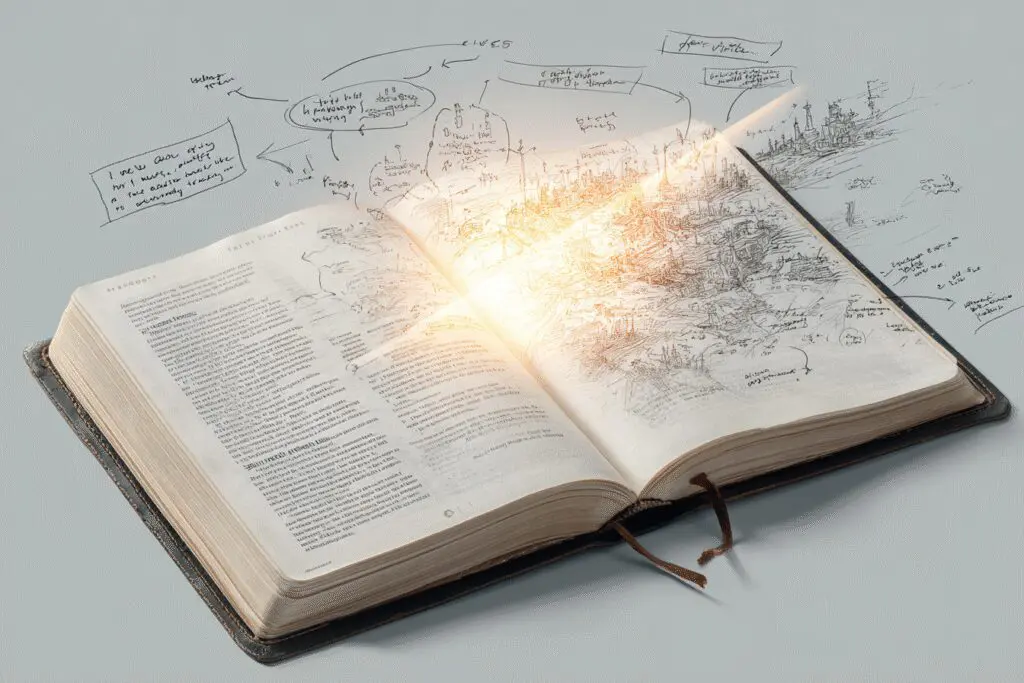Have you ever closed your Bible and immediately forgotten what you just read? I’ve been there more times than I can count. For years, my “quiet time” felt more like a quiet chore. I would read a chapter, close the book, and move on with my day, with little to no real change in my heart or mind. It was frustrating. I knew God’s Word was supposed to be alive and active, but for me, it felt distant. Everything changed when I learned how to take Bible notes effectively.
It wasn’t about becoming a scholar overnight. It was about turning passive reading into an active conversation with the God who wrote it. This one shift transformed my understanding of Scripture and, more importantly, my relationship with Jesus. If you’re feeling stuck, I want to show you that you can experience the same transformation. It starts with just a pen and an open heart.
More in Bible Category
What Does the Bible Say About Reading the Bible
What Is the Best Way to Read the Bible
Key Takeaways
- Note-taking is active, not passive. It forces you to slow down, think deeply, and engage with the text, which dramatically improves memory and understanding.
- There is no “right” way. The best method is the one that works for you. Experiment with different styles like SOAP, verse mapping, or simple journaling to find your fit.
- Start with prayer, not a pen. The ultimate goal is to connect with God. Ask the Holy Spirit to guide your understanding before you even begin to read or write.
- It’s a relationship, not a ritual. Don’t get bogged down by perfect handwriting or elaborate systems. The focus should always be on what God is saying to you through His Word.
- Consistency trumps intensity. A few heartfelt notes taken ten minutes a day are far more valuable than a three-hour study session once a month that leads to burnout.
Why Should You Even Bother Taking Notes on the Bible?
Let’s be honest, the idea of “studying” can sometimes feel like a throwback to high school homework. You’ve got a busy life. Is it really worth the extra time to write things down? The answer is a resounding yes. It’s one of the most powerful catalysts for spiritual growth.
When you simply read, information tends to flow in one ear and out the other. But the physical act of writing engages your mind and body in a different way. You’re forced to process what you’re reading, to put it into your own words, and to consider its meaning more deeply.
Furthermore, your notes become a spiritual journal. They create a record of your journey with God. You can look back weeks, months, or even years later and see how God has been faithful, what He has taught you, and how much you have grown. It’s a beautiful testament to His work in your life.
Does Taking Notes Actually Help You Remember Scripture?
Absolutely. Studies in education consistently show that when we write something down by hand, our brain processes and retains the information far better than if we just read it or type it. The act of forming letters and structuring thoughts on a page builds stronger neural pathways.
Think about it. When you take the time to write out a specific verse, you are focusing on every single word. You are seeing it, thinking about it, and physically recording it. This multi-sensory engagement makes it much more likely that the verse will stick in your memory when you need it most.
How Can Note-Taking Deepen Your Relationship with God?
This is the real heart of the matter. Taking Bible notes shifts your posture from being a passive audience member to an active participant in a conversation. As you write down your questions, your praises, your struggles, and your insights, you are directly interacting with God through His Word.
The Bible stops being just an ancient book and becomes a living letter from God to you. Your notes are your response. It’s in that sacred space—the margin of your Bible or the page of your notebook—that a deeper, more personal relationship with the Lord is often forged.
Gathering Your Tools: What Do You Actually Need?
You don’t need a seminary degree or a fancy budget to get started. The barrier to entry is wonderfully low. The goal is to remove distractions and find tools that help you focus on the Word, not on the tools themselves.
Simplicity is your best friend here. While there are countless journals, pens, and apps available, you can truly start today with what you already have. Don’t let the search for the “perfect” supplies keep you from starting.
What Is the Best Kind of Bible for Taking Notes?
- Journaling Bible: These are incredibly popular for a reason. They have extra-wide margins on the sides of the page specifically designed for you to write, draw, and reflect. This is my personal favorite because it keeps my notes right next to the text.
- Wide-Margin Bible: Similar to a journaling Bible, but often with a bit more space all around the text block. They provide ample room for notes without being as structured as a journaling Bible.
- A Standard Bible and a Notebook: This is the classic, time-tested method. It’s simple, affordable, and effective. You have unlimited space for your thoughts without worrying about cramming them into a small margin. Any spiral notebook will do!
Digital vs. Analog: Is a Notebook or an App Better?
This really comes down to personal preference. There’s no right or wrong answer, only what works best for your life and learning style.
The Case for a Notebook (Analog):
- Fewer distractions (no notifications popping up).
- Better for memory retention, as mentioned earlier.
- Creates a tangible, physical record of your journey.
The Case for an App (Digital):
- Extremely portable (your phone is always with you).
- Powerful search functions to find old notes.
- Easy access to commentaries, dictionaries, and different translations. (YouVersion and Logos are great options).
My advice? Try both! Maybe you use an app during your lunch break at work and a physical notebook for your quiet time at home.
Are There Specific Pens or Highlighters That Are Better?
If you are writing directly in your Bible, this is an important question. The thin pages of most Bibles are prone to ink bleeding through, which can be distracting.
Look for pens labeled “archival” or “pigment-based.” Pigma Micron pens are a gold standard for many Bible journalers because they don’t bleed or fade. For highlighting, look for “Bible-safe” highlighters or gel highlighters. They go on dry and won’t wrinkle or bleed through the page.
Before You Even Write a Word: Preparing Your Heart
This is the most important step, and it’s the one we most often skip in our rush to be productive. Taking Bible notes is a spiritual discipline, not just an intellectual exercise. The state of your heart before you open the Word will determine how much you get out of it.
Your goal isn’t to accumulate knowledge; it’s to encounter the living God. That requires a posture of humility and dependence.
Why Should You Always Start with Prayer?
Prayer is what turns your study time from a monologue into a dialogue. Before you read, take a moment to quiet your heart and talk to God.
Acknowledge that you need His help. The Bible itself says that spiritual truths are understood through the Spirit (1 Corinthians 2:14). Ask the Holy Spirit, the author of the book, to be your teacher. Ask Him to open your eyes to see wonderful things in His law (Psalm 119:18), to give you understanding, and to help you apply what you read to your life.
How Do You Approach the Bible with an Open and Teachable Spirit?
Come to the text with humility. Be willing to be challenged, corrected, and changed by what you read. It’s easy to come to the Bible looking for verses that confirm what we already believe, but true growth happens when we allow God’s Word to shape our beliefs.
This means setting aside your preconceived notions. It means being willing to sit with confusing passages and ask questions. A teachable spirit says, “God, I don’t know everything, but I trust You. Teach me Your ways.”
Popular Bible Note-Taking Methods You Can Try Today
Okay, you’ve prayed, you have your Bible and a pen, and you’re ready to dive in. But what do you actually write down? Staring at a blank page can be intimidating. Here are a few simple, structured methods to get you started. These are not rigid rules, but helpful frameworks.
What is the SOAP Method and How Does it Work?
The SOAP method is one of the most popular and straightforward ways to study a passage of Scripture. It’s an acronym that gives you four simple steps to follow. It’s perfect for beginners but powerful enough for a lifetime of use.
- S – Scripture: First, choose a verse or a short passage that stands out to you and write it out word for word. The act of physically writing it down forces you to slow down and pay attention to each word.
- O – Observation: Now, look closely at what you just wrote. What does it actually say? Answer some basic questions: Who is speaking? Who is the audience? Are there any repeated words or ideas? What is the main point of this passage? Write down your objective observations without trying to interpret them yet.
- A – Application: This is where it gets personal. How does this truth apply to your life, right here, right now? Is there a command to obey? A promise to claim? A sin to confess? A truth about God to praise Him for? Write down a specific, personal action step.
- P – Prayer: Finally, turn your application into a prayer. Write a simple prayer to God, asking Him to help you apply what you’ve just learned. This closes the loop and brings your study time back into conversation with Him.
How Can You Use Chapter Summarization for a Big-Picture View?
Sometimes we get so focused on individual verses that we miss the forest for the trees. The chapter summarization method helps you understand the broader context of what you’re reading.
The process is simple: read through an entire chapter once without stopping. Then, in your own words, write a one to three-sentence summary of what the chapter was about. What was the main event, the main argument, or the main theme? Doing this regularly will give you a much better grasp of the narrative and flow of the entire Bible.
What is Verse Mapping and Is It Good for Deep Dives?
If you enjoy digging deep into the meaning of words and concepts, verse mapping might be for you. This is a more visual and investigative method that helps you unpack the richness of a single verse.
Here’s a simple way to do it:
- Write the Verse: Write your chosen verse in the center of your page.
- Highlight Keywords: Underline or highlight the key words or phrases in the verse.
- Define and Research: Look up these words in a Bible dictionary or using an online tool like Blue Letter Bible. What did they mean in the original Hebrew or Greek? Write down the definitions.
- Find Cross-References: Use your Bible’s cross-references or an online tool to find other places in the Bible where these words or concepts are mentioned. This helps you understand how Scripture interprets Scripture.
- Summarize and Apply: In your own words, rewrite the verse based on your deeper understanding, and then write a personal application, just like in the SOAP method. For more guidance on study methods, Dallas Theological Seminary offers some excellent free resources. You can explore A Guide to Bible Study Methods here.
The Character Study Method: How Do You Learn from People in the Bible?
The Bible is filled with the stories of real, flawed people. Studying their lives can teach us so much about God and about ourselves.
To do a character study, pick one person from the Bible (like David, Mary, Peter, or Ruth). As you read the passages about them, take notes on the following:
- Their background and key life events.
- Their strengths and positive character traits.
- Their weaknesses, sins, and mistakes.
- Key conversations or choices they made.
- How did God work in their life?
- What lessons can you learn from their story?
Developing Your Own System: Making It Personal
After you’ve tried a few of the methods above, you’ll start to figure out what you enjoy and what helps you connect with God most effectively. The ultimate goal is to develop a personalized system that becomes second nature. Don’t be afraid to mix and match or create something entirely new!
How Do You Create a Color-Coding System That Works?
A color-coding system can be a fantastic way to quickly identify key themes in the text. The key is to keep it simple and consistent. If it’s too complicated, you’ll never use it.
Here is a sample system to get you started:
- Yellow: Promises from God / Truths about God’s character.
- Blue: Commands to obey.
- Green: Principles for wisdom and living.
- Orange/Red: Key words, cross-references, or things to study further.
- Pink: Prophecies or references to Jesus.
Write your color key on a notecard and keep it in your Bible. Most importantly, make it your own!
Using Symbols and Doodles: Is It Okay to Get Creative?
Yes! Your notes are for you and God. If drawing a little lightbulb next to a new insight helps you remember it, do it. If a heart next to a promise helps it sink in, doodle away. Visual cues are powerful memory aids. This isn’t about creating a masterpiece; it’s about engaging with the text in a way that works for your brain.
Why You Shouldn’t Be Afraid to Ask Questions in Your Notes
Your journal is a safe space. It’s perfectly okay—in fact, it’s encouraged—to write down your honest questions and even your doubts.
Writing “I really don’t understand what this means” or “God, why did this happen?” is an act of faith. It shows you are engaged enough to wrestle with the text, and it invites God into your process of seeking understanding. Often, the questions you write down one year will be the praises you record the next as God faithfully provides answers and insight.
Putting It All Together: A Practical Walkthrough
Let’s take a very famous passage, Proverbs 3:5-6, and quickly apply the SOAP method to it.
Scripture: “Trust in the Lord with all your heart, and do not lean on your own understanding. In all your ways acknowledge him, and he will make straight your paths.”
Observation: This is a command followed by a promise. The commands are: “Trust in the Lord,” “do not lean on your own understanding,” and “acknowledge him.” The promise is that “he will make straight your paths.” The word “all” is used twice—”all your heart” and “all your ways.” This implies total commitment, not partial. “Leaning” suggests depending on something for support. The verse contrasts leaning on our own limited understanding with trusting God completely.
Application: I am in a season of uncertainty about my career path. My own understanding tells me to be anxious and to try to control every outcome. This verse is calling me to actively stop relying on my own wisdom and to instead trust God with the future. My application step is to, in every decision I make today regarding work, consciously stop and acknowledge God’s sovereignty. Instead of worrying, I will choose to trust that He has a good plan.
Prayer: “Lord, thank you for this promise. I confess that I lean on my own understanding way too much, and it leads to anxiety. Please help me to trust you with ALL my heart today, especially with my job situation. Show me how to acknowledge you in all my ways, and I trust that you will make my path straight. Amen.”
Common Pitfalls and How to Avoid Them
As with any discipline, you will face challenges. Knowing what they are ahead of time can help you navigate them with grace.
What Happens When You Feel Unmotivated to Take Notes?
It will happen. There will be days when you feel dry, distracted, or just plain tired. In those moments, do not give in to guilt. Guilt is not from the Lord. Instead, give yourself grace.
- Start small: Just write down one verse. That’s it.
- Just show up: Open your Bible and pray, even if you don’t feel like it. The Holy Spirit can work even with the smallest amount of willingness.
- Remember your “why”: Remind yourself that you’re doing this to know Jesus better, not to check a box.
Are You Focusing Too Much on the Method Instead of the Message?
Your note-taking method is a tool, not the goal. If you find yourself obsessing over having the “perfect” notes or following a method flawlessly, it might be time to simplify. The goal is to hear from God, not to create a perfect notebook. If your system is causing you stress, change it! Go back to simply writing down whatever is on your heart as you read.
The Trap of Comparison: Why Your Notes Don’t Need to Look Like Instagram Posts
Social media is flooded with images of beautiful, artistic Bible journaling. While this can be inspiring, it can also lead to comparison and feelings of inadequacy.
Remember this: God is far more interested in the condition of your heart than the aesthetic of your handwriting. Your messy, tear-stained, question-filled notebook is just as beautiful to Him—perhaps even more so—than a flawless work of art. Do not let the pressure to be perfect keep you from being present with the Lord.
Your Invitation to a Deeper Walk
Learning how to take Bible notes isn’t about adding another rule to your life. It’s an invitation from God to go deeper, to know Him more intimately, and to have His truth transform you from the inside out.
It’s a journey, not a destination. Your methods will change over time as you grow and your seasons of life shift. That’s okay. The constant is the God who meets you in His Word.
So, just start. Don’t wait until you have the perfect pen or the perfect plan. Grab a notebook, open His Word, and ask Him to speak to you. He is faithful and He will meet you there.
Frequently Asked Questions – How to Take Bible Notes

How can I make my Bible notes a personal conversation with God?
Transform your notes into a personal conversation by asking questions, expressing gratitude, and turning Scripture into prayers. Write your questions bravely knowing God welcomes your doubts and thoughts, and pray using verses as a guide to speak directly to God from your heart.
What are effective methods for taking Bible notes?
Effective methods include simple journaling, where you write thoughts and questions freely, and structured methods like the S.O.A.P. technique, which involves writing out Scripture, observations, applications, and prayers to deepen your understanding and personal connection to the Word.
What kind of Bible and pens are best for taking Bible notes?
The best Bible for notes is one you will use regularly, such as a journaling Bible with wide margins. For pens, fine-tipped options like Pigma Micron or simple ballpoint pens work well, and using colored pencils or highlighters can add clarity and joy to your notes without bleeding through pages.
Should I use a physical notebook or a digital app for taking Bible notes?
Deciding between a physical notebook or a digital app depends on your personal preference. A physical notebook can be distraction-free and aid in deeper thinking, while a digital app offers portability, easy searching, and quick copying of verses. Choose what best helps you focus and stay consistent.




